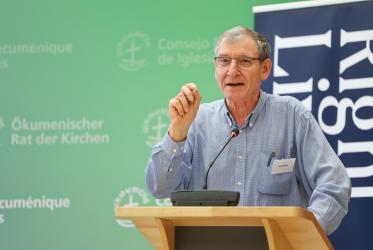Displaying 1 - 20 of 40
Churches should use their voice on climate change
26 February 2020
CCIA meets in Brisbane with focus on Pacific regional priorities
19 February 2020
Church response to Australian bushfires hinges on preparation
07 January 2020
La réponse des Églises aux feux de brousse est mûrement préparée
07 January 2020
WCC condemns massacre of farmers in Philippines
12 April 2019
Le COE condamne le massacre de fermiers aux Philippines
12 April 2019
All pilgrim routes lead to COP24
11 December 2018
#WCC70: A prayer about health and healing
20 July 2018
#WCC70: Une prière pour la santé et la guérison
20 July 2018
“Overcoming economic injustice” vision of WCC’s Athena Peralta
23 February 2017
New videos help congregations hasten HIV response
20 October 2016
GEM school ends with hope for a better tomorrow
08 September 2016
L’École GEM s’achève sur l’espérance d’un avenir meilleur
08 September 2016








